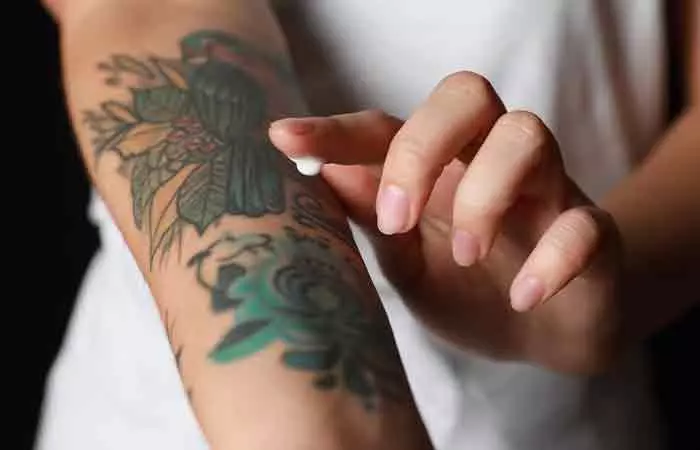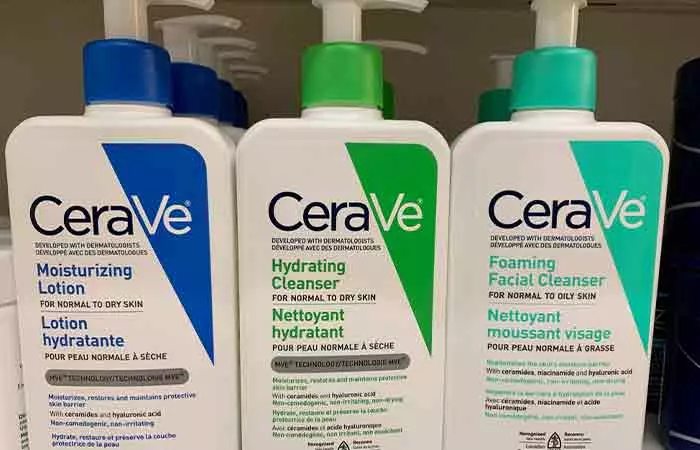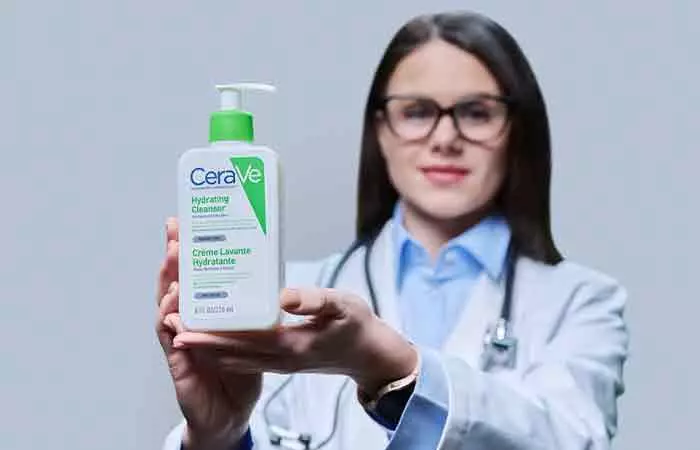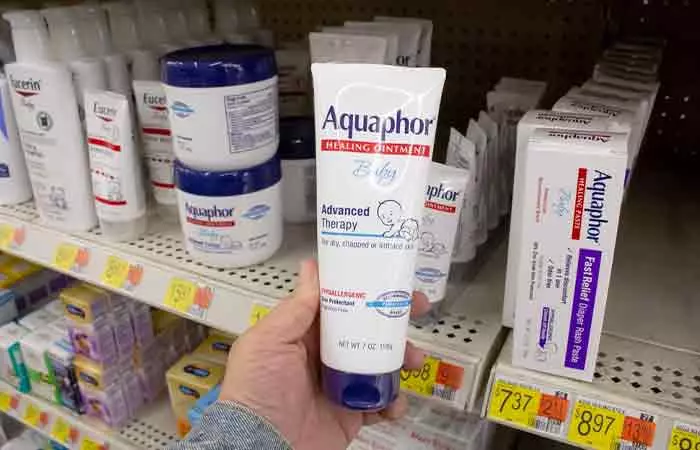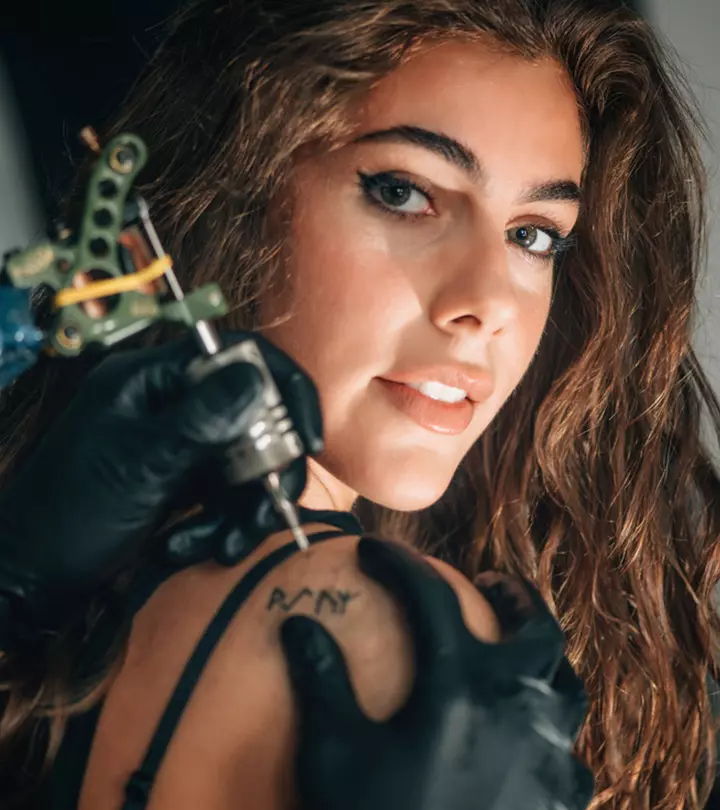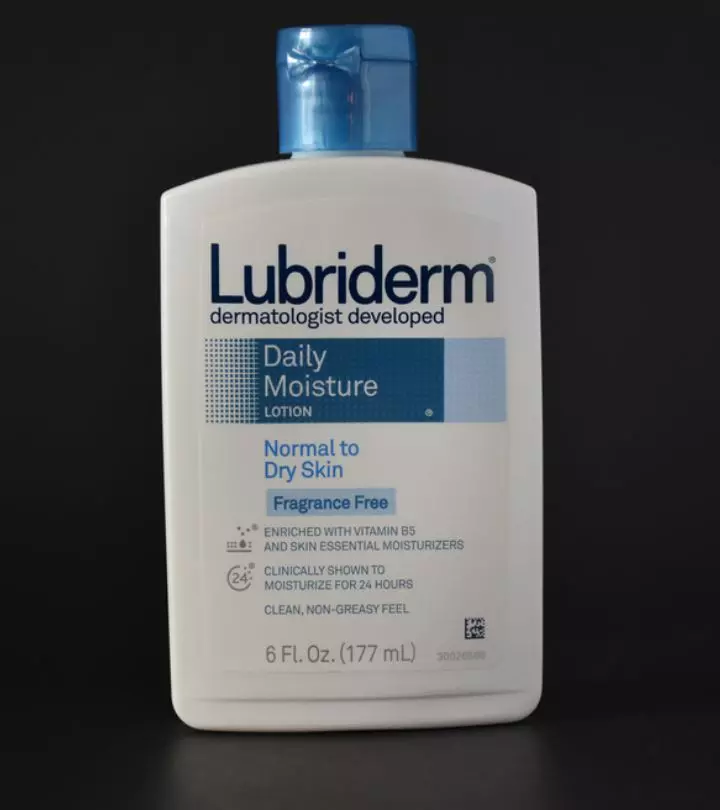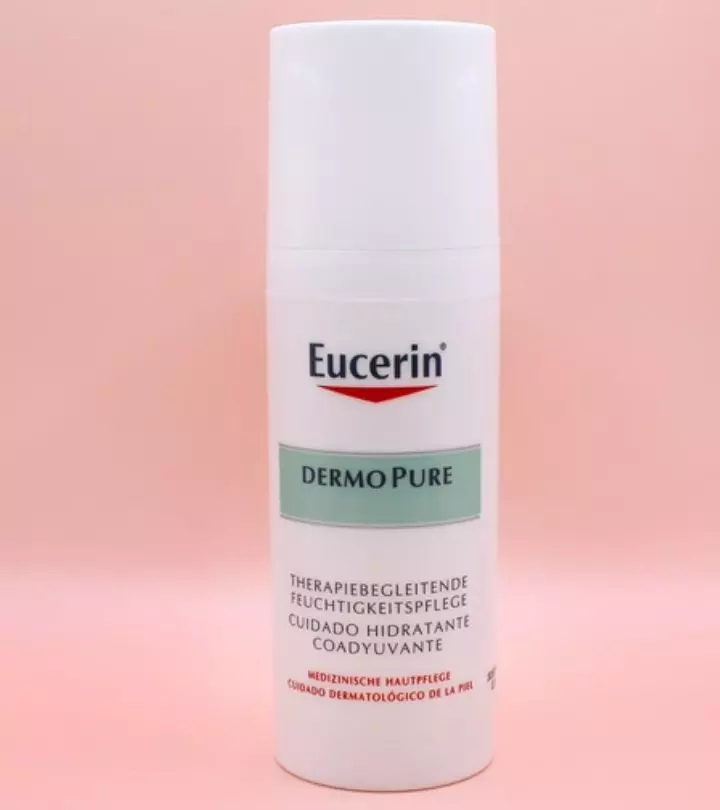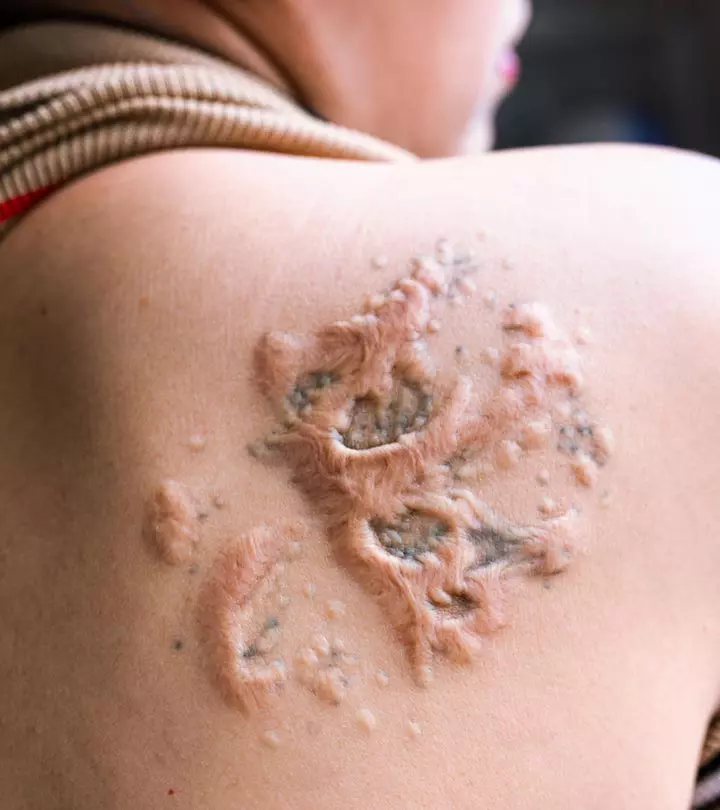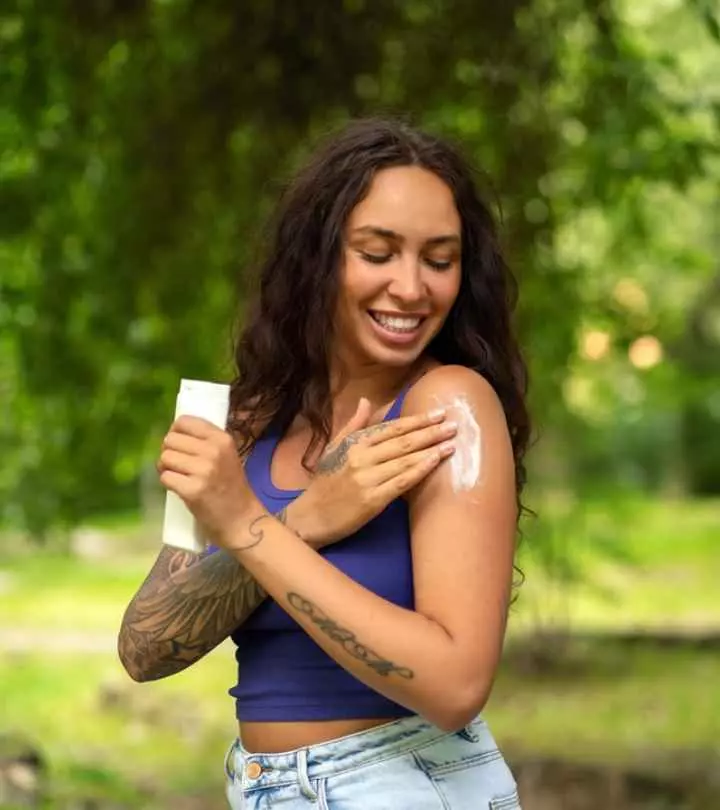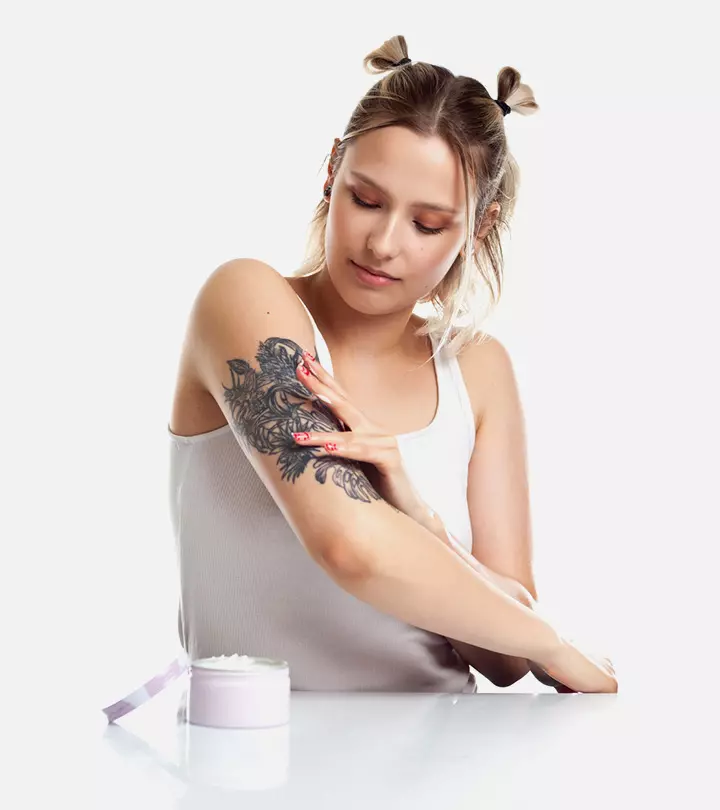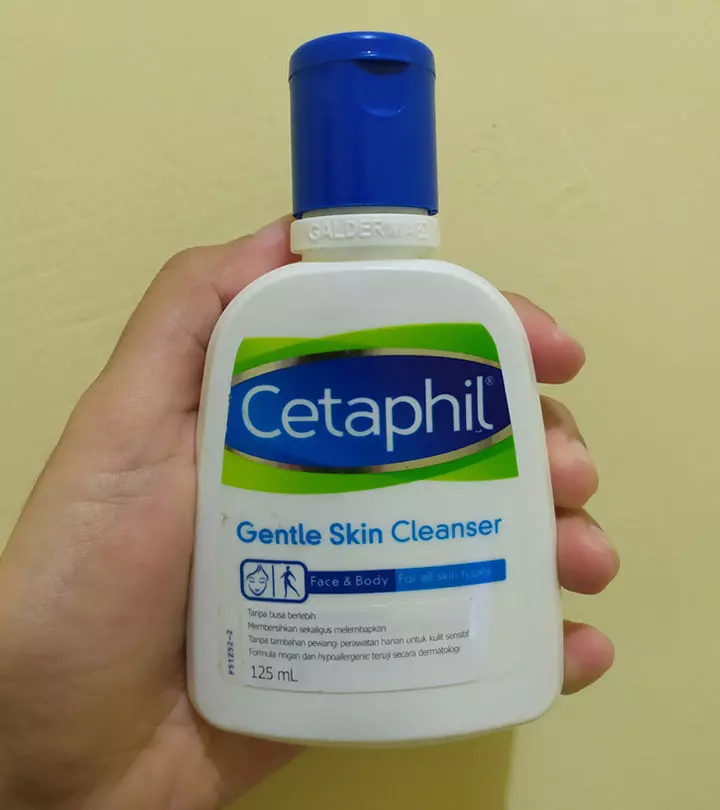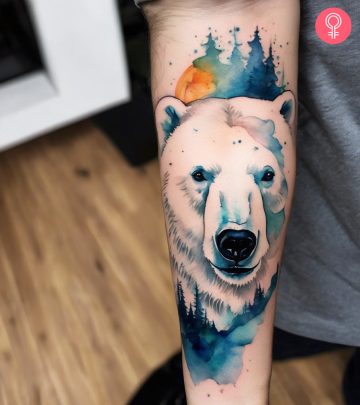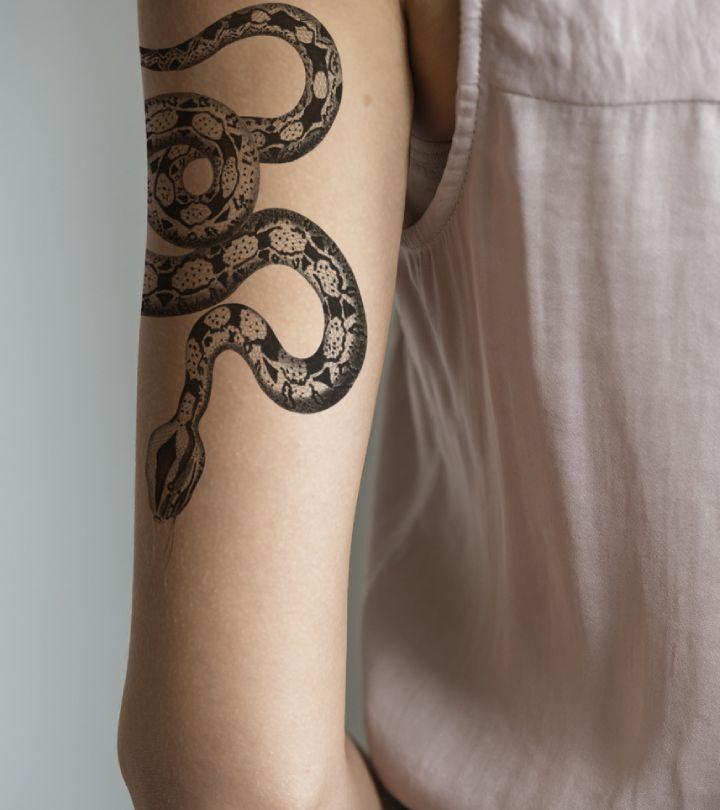Is CeraVe Good For Tattoos? A Complete Guide
Repair your skin and heal your ink with CeraVe skin care products.
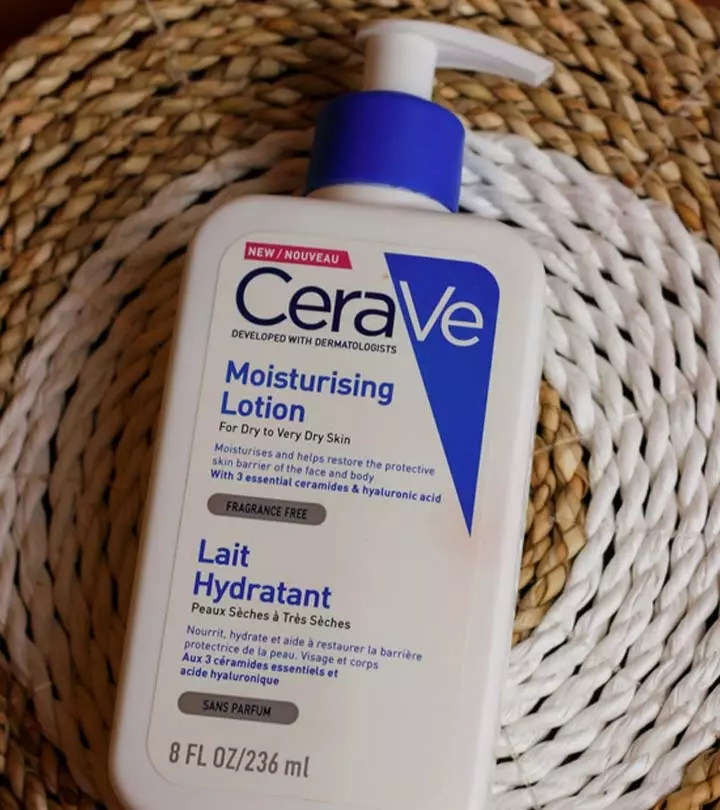
Image: Shutterstock
Tattoos are personal expressions etched onto your skin; they speak volumes, but their vibrancy depends on meticulous care for your skin. After getting a new tattoo, moisturization is a key step that should be included in your aftercare routine to not only keep your tattoo well-pigmented, but also aid skin recovery. This is where CeraVe comes to help you. So, why is CeraVe good for tattoos? The answer lies in the range of ingredients used in their formulas. From improving hydration to protecting the skin barrier, CeraVe products help nurture the inked skin, maintaining its aesthetic brilliance and underlying health.
Use this article as an aftercare guide to help you understand the basics of using CeraVe for tattoo healing. Keep reading to know about this product’s benefits, the frequency of application, method of use, and more.
In This Article
Is CeraVe Good For Tattoos?
Yes. CeraVe is good for tattoos mainly because of its fragrance-free lineup. Using scented lotions may lead to issues like allergic contact dermatitisi An allergic reaction that occurs when the skin comes into contact with an allergen, resulting in irritation or inflammation , resulting in scarring and early fading of new tattoos (1). It may prevent premature tattoo peeling and ensure a healthier healing process for tattooed skin, as it is packed with ceramidesi The fat molecules naturally found in the skin that help maintain its protective barrier and moisture retention. . Their MVE technologyi is a game-changer, consistently hydrating the skin layers and accelerating the tattoo healing process while creating a protective barrier that retains the skin’s natural moisture. Also, the presence of moisturizing ingredients like hyaluronic acidi A natural substance present in the skin that retains moisture and keeps the skin hydrated and plump maintains skin elasticity, promoting smoother healing and preserving the tattoo’s vibrancy. CeraVe’s products may help ensure effective tattoo care by moisturizing your newly tattooed skin, preventing irritation, offering rapid healing, and maintaining the vibrancy of the tattooed art.
However, since CeraVe products are not specifically made for tattoo aftercare routine, it is best to seek guidance from your tattoo artist and dermatologist before using them. They may recommend using a specialized tattoo aftercare product. Keep reading to know more about how exactly a CeraVe lotion works for your tattooed skin.
Can I Use CeraVe Lotion On My Tattoo?
When it comes to caring for your tattoo, keeping it moist is key. Dryness can cause problems like cracking, itching, and delayed healing. Applying a moisturizer while your tattoo is healing is a widely used method to aid wound recovery and lessen any discomfort you may feel (2). Therefore, moisturization is important for the healing skin and a CeraVe lotion is an excellent option for this. It is oil-free and lightweight, ensuring no sticky or greasy residue on your tattoo, while its hyaluronic acid content maintains skin moisture for an extended period. It may minimize scabbing issues and aid healing thanks to the three ceramides it contains. It may also prevent potential skin irritation or burns that fragranced lotions might cause to your tattooed or sensitive skin.
Thanks to all its many properties, you must be eager to learn more about applying a CeraVe product on your newly inked skin. Read on to know more about the frequency of using CeraVe skincare products for speeding the tattoo healing process.
How Often Should I Use CeraVe On My Tattoo?
Once your tattoo stops scabbing and peeling, it is safe to start using a mild, unscented lotion, even on a new tattoo. A gentle, light moisturizer can help soothe the discomfort you feel if you experience itching. The frequency of application depends on your skin type. If your skin tends to be excessively dry, you might need to apply it every 4 to 6 hours. For those with normal skin, 3 times a day could be sufficient. Those with oily skin may need to only apply it once a day. Generally, applying a dermo-cosmetic product for 14 days may help improve the skin’s redness, itching, burning sensation, and edema and repair the skin (2). However, since there are no specific instructions to follow about applying CeraVe for tattoos, it is best to consult your tattoo artist to determine the frequency of application and for other aftercare instructions.
Using these products consistently and properly may help you achieve better skin health and long-lasting vibrant tattoos. There are several CeraVe products that can help improve skin health and offer proper care after tattooing. The specialty of CeraVe skin care products lies in the hydrating ingredients used to formulate these effective formulas. Here are a few benefits of using them:
Benefits Of Using CeraVe For Tattoo Healing
1. May Keep The Area Free From Infection
CeraVe products are non-comedogenic and may be ideal for those prone to acne (3). It may also help keep the tattoo healthy and prevent the risk of infection. This ensures faster healing, an important aspect of tattoo aftercare.
2. May Moisturize Skin And Improve Skin Barrier Function
Ceramides are widely recognized for their crucial role in structuring and preserving the skin’s ability to maintain its water barrier function, and hyaluronic acid plays an important role in managing the hydration and elasticity of the skin (4), (5). Keeping the tattoo hydrated may also prevent color fading. Since CeraVe products contain these as key ingredients, they may be one of the best choices for a tattoo aftercare cream.
3. May Help Soothe And Heal The Skin Faster
Niacinamidei A form of vitamin B3 known for its skin-restoring, soothing properties, improving skin texture, and reducing inflammation features in various CeraVe products such as facial cleansers, moisturizers, lotions, and creams designed for different skin types and concerns, including sensitive and acne-prone skin. The topical application of niacinamide helps stabilize the skin barrier function, reducing water loss and enhancing moisture (6). Its anti-inflammatory and soothing properties may benefit skin conditions like irritation and itchiness, caused due to tattooing, and may also offer faster healing time.
4. May Be Suitable For Delicate Skin
Developed with dermatologists, these are expert-recommended products that may suit all skin types, including sensitive and delicate skin. Therefore, these products are safe to use on the skin to keep your tattoo healthy and clean.
When it comes to attaining all these benefits, can all CeraVe products be useful for proper tattoo aftercare? Let us find that out in the next section.
CeraVe Products That Are Good For Tattoos
Apart from the CeraVe lotion, there are other CeraVe skincare products that you can add to your tattoo care routine. Some of the most beneficial tattoo aftercare products include the following:
- CeraVe Hydrating Body Wash
It offers a gentle cleansing experience that doesn’t strip the skin of its moisture. Infused with ceramides and hyaluronic acid, this body wash is not harsh and does not leave your skin feeling tight. It delicately cleanses while helping the skin maintain its hydration level. This body wash, developed with dermatologists, is designed to refresh and restore the skin’s natural moisture barrier for irritated skin. It has essential ceramides, hyaluronic acid, and emollients that moisturize and soften the skin, providing long-lasting hydration. Its non-irritating formula suits normal to dry skin types, ensuring a gentle yet effective cleanse. Therefore, it may be a good choice to keep the skin hydrated and clean during the tattoo healing process.
- CeraVe Facial Cleanser
CeraVe’s facial cleanser combines moisturizing ingredients like hyaluronic acid and glycerin to maintain skin moisture and provide effective cleansing for tattoos. This hydrating cleanser not only cleans but also moisturizes, preventing itchiness or dryness post-application. Its non-comedogenic nature makes it ideal for acne-prone, oily, and sensitive skin types. It is free from harmful components like sulfates, parabens, and fragrances that could potentially damage tattoos. Plus, this gentle cleanser also ensures minimal risk of allergic reactions on tattooed and delicate skin.
- CeraVe Healing Ointment
The CeraVe Healing Ointment offers specialized care for dry or damaged skin. Infused with petrolatumi A semisolid mixture derived from petroleum, commonly used as a skin emollient to retain moisture and protect the skin barrier , hyaluronic acid, and ceramides, it provides deep hydration and fortifies the skin’s natural barrier. This unscented and non-comedogenic ointment acts as a protective layer, aiding healing and preventing moisture loss in newly tattooed skin. It may also help prevent other skin issues like chafing, cuts, or burns. It ensures long-lasting moisture, promotes the skin’s natural healing process, and strengthens the moisture barrier, making it a great choice for tattoo aftercare.
- CeraVe Moisturizing Cream
For those experiencing persistent dryness even after using a lotion, the CeraVe Moisturizing Cream is an excellent option to try, especially if you have gotten a new tattoo. Its MVE technology ensures long-lasting moisture for all skin types, important for tattoo aftercare. This cream may help combat flakiness, itchiness, and excessive scabbing associated with tattoo healing. Ceramides help reduce dryness, while hyaluronic acid preserves natural skin moisture. Maintaining moisture during healing is vital, as excessive dryness and scabbing may lead to tattoo fading.
Mei Pang, a beauty and lifestyle content creator shared her tattoo aftercare routine that involved using CeraVe moisturizing cream. She used the cream to moisturize the area when she felt it was fit to do so. In the video, she says, “I personally find this part super satisfying because you can’t see any of the flakes anymore. It just retains moisture (i).”
 Trivia
TriviaNow that you know the products to use, it is important to know how to use these to avail the healing and soothing properties of facial cleansers, lotions, and creams. Keep reading to learn how to properly use this brand’s products for tattoo aftercare.
How To Use CeraVe For Tattoos
Be it a CeraVe lotion, healing ointment, or moisturizing cream, follow similar steps for application to ensure effective care for your tattoo.
- Start by washing your hands thoroughly before touching the tattoo to prevent bacterial contamination.
- Pat dry your newly inked skin with a clean paper towel. If your skin is still damp, then allow it to air-dry for a bit.
- Apply a small amount of the CeraVe product onto your fingertips and gently massage it into the tattoo until fully absorbed.
- Repeat this process every 4 to 6 hours daily until the tattoo has completely healed.
- Use gentle, circular motions while applying the cream to avoid irritation.
If you notice any unusual redness, swelling, or discomfort, seek advice from your tattoo artist or a healthcare professional.
Also, it is important to keep the tattoo clean and avoid direct sun exposure during the healing period. For that, you may use an antibacterial soap or even a CeraVe facial cleanser. Their facial cleanser provides a gentle and efficient way to cleanse fresh tattoos, removing dirt without causing skin irritation. This formula has hydrating ingredients that may also help in the healing process. Here is how to apply the facial cleanser for better skin recovery.
- Wash your hands thoroughly and wet the area with lukewarm water.
- Apply a pea-sized amount of CeraVe facial cleanser to the tattooed skin.
- Gently rub it in circular motions.
- Rinse it off with warm water and pat dry with a clean towel.
- You may follow it with a tattoo healing ointment, lotion, or a moisturizing cream.
 Quick Tip
Quick TipBesides CeraVe, there are also other brands that may work well for your skin. Scroll down to read about them.
CeraVe Alternatives For Tattoos
If CeraVe does not work for you, then you can consider using Aquaphor, Cetaphil, and Lubriderm as solid alternatives. These options work just as well, offering hydration that soothes and rejuvenates your skin. They are like a shield for your tattoo, keeping it healthy and happy as it heals. Alternatively you can also use natural moisturizing ingredients like aloe vera, shea butter, and cucumber paste. However, make sure to consult your dermatologist and tattoo artist before using any of these products.
So what sets CeraVe products apart from these other brand products? And which one is better for your tattoo? Learn more down below!
- CeraVe Vs. Cetaphil For Tattoos
CeraVe products have a hydrating formula that contains hyaluronic acid and ceramides. Be it the CeraVe facial cleanser, moisturizing cream, or lotion, they all offer deep hydration. Likewise, Cetaphil also has popular skin care products that may help prevent skin damage and have healing properties. However, it may not be a good choice for those with dehydrated skin as the hydration is less intense.
- CeraVe Vs. Aquaphor For Tattoos
CeraVe products concentrate more on protecting and repairing the skin barrier. Aquaphor contains petrolatum and lanolin that may help create an extra layer of protection for the skin to ensure proper healing and deeper penetration of tattoo ink into the skin (7), (8). So, you can use a little bit of both. Use Aquaphor for lightly coating a fresh tattoo and CeraVe to restore and strengthen the skin barrier. Both products are good for dry and sensitive skin.
- CeraVe Vs. Lubriderm For Tattoos
Lubriderm, known for its easily absorbed, lightweight formula, proves ideal for those who prefer lighter options. Opting for Lubriderm Daily Moisture Lotion or Lubriderm Advanced Therapy Moisturizing Lotion for tattoo aftercare may prevent dryness, preserve the skin’s moisture levels, and maintain healthy skin conditions. You may use it if you prefer a lighter texture than CeraVe products.
CeraVe’s fragrance-free products, featuring nourishing ingredients like ceramides, hyaluronic acid, and niacinamide, are some of the best products for tattoo aftercare. These expert-recommended formulations help maintain moisture levels needed for healing and preventing dryness, allergic reactions, and potential infections. From facial cleansers to healing ointments and moisturizing creams, CeraVe’s diverse range ensures comprehensive care. While alternatives like Cetaphil, Aquaphor, or Lubriderm offer various advantages, CeraVe’s focus on barrier repair and hydration makes it a dependable choice for sensitive skin. However, it is advisable to seek advice from your tattoo artist or a skincare professional regarding the best products to use and how often to apply them for optimal results.
Frequently Asked Questions
Can you use CeraVe sunscreen on a fresh tattoo?
Using sunscreen on new tattoos may cause irritation and ink fading. Wait until your tattoo fully heals, around 2 weeks, before applying CeraVe’s specific sunscreen for tattoos. CeraVe’s mineral sunscreens may be the ideal choice for optimal protection.
Can CeraVe help with tattoo color preservation?
Applying CeraVe on tattoos helps protect them from environmental stressors that might dull their color or brightness. Their products also moisturize the tattoo, preserving the ink’s color.
Can CeraVe be used on a tattoo every day?
Yes, CeraVe can generally be used daily on a tattoo to help maintain skin health and hydration. However, it is essential to follow individual skin needs and the advice of your tattoo artist or a dermatologist for the best care routine.
Key Takeaways
- CeraVe’s fragrance-free products, rich in ceramides and hyaluronic acid, may help promote tattoo healing.
- From facial cleansers to ointments, the CeraVe products promote hydration and skin barrier repair crucial for effective tattoo aftercare.
- Proper application techniques and frequent hydration with CeraVe products, may ensure better tattoo healing and vibrancy preservation.
- There are other alternatives you can use instead of CeraVe. However, it is best to consult your dermatologist and tattoo artist for personalized aftercare instructions.

Image: Dall·E/StyleCraze Design Team
CeraVe healing ointment provides deep hydration and protection, ideal for dry skin, healing tattoos, and soothing irritation. Watch now to learn how it protects and hydrates. Find out more in the video!
Personal Experience: Source
StyleCraze's articles are interwoven with authentic personal narratives that provide depth and resonance to our content. Below are the sources of the personal accounts referenced in this article.
(i) Tattoo Aftercare: How I Heal My Tattooshttps://www.youtube.com/watch?v=PWnVxgtC48Q
References
Articles on StyleCraze are backed by verified information from peer-reviewed and academic research papers, reputed organizations, research institutions, and medical associations to ensure accuracy and relevance. Read our editorial policy to learn more.
- Scented lotions may cause scaring and premature fading of tattoos
https://pubmed.ncbi.nlm.nih.gov/33147671/ - Tattoo aftercare management with a dermo-cosmetic product: Improvement in discomfort sensation and skin repair quality
https://pubmed.ncbi.nlm.nih.gov/33884740/ - Acne Vulgaris
https://www.ncbi.nlm.nih.gov/books/NBK459173/ - Ceramides and skin function
https://pubmed.ncbi.nlm.nih.gov/12553851/ - [Skin hydration and hyaluronic acid]
https://pubmed.ncbi.nlm.nih.gov/20435251/ - Nicotinic acid/niacinamide and the skin
https://pubmed.ncbi.nlm.nih.gov/17147561/ - In vivo investigations on the penetration of various oils and their influence on the skin barrier
https://pubmed.ncbi.nlm.nih.gov/22092829/ - Lanolin
https://pubmed.ncbi.nlm.nih.gov/36917502/
Read full bio of Anjali Sayee
Read full bio of Gazala Firdos Ansari




